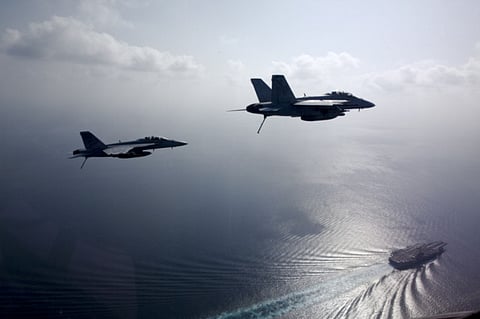US committed to military ties to region
Syria’s civil war and Iran’s nuclear programme have led to tensions

Dubai/Washington: Washington is signalling its military commitment to its Gulf Arab allies at a time of unfamiliar strain in their decades old partnership.
Syria’s civil war and Iran’s nuclear programme have led to tensions, with Gulf Arab states willing a more assertive US response to bring Iran to heel and force Syrian President Bashar Al Assad from power. Growing US energy independence has further complicated a relationship founded on oil and defence.
Some Gulf Arab oil states had even begun to wonder if the alliance was anything more than the “practical marriage of convenience for a finite period of time” that Henry Kissinger, in a 2007 interview, saw in Washington’s ties to Saudi Arabia.
Washington is moving to dismiss such doubts, indicating its military partnership with the ruling dynasties who sit on a third of the world’s conventional oil reserves will remain deep-rooted, even if trimmed by budget cuts at home.
“The United States isn’t going anywhere. The United States is firmly committed to the security of all our regional partners,” said a senior official accompanying US Defence Secretary Chuck Hagel in the Middle East last week. “We understand in a clear-eyed way what the threats are in the region.”
A few days before the trip, President Barack Obama welcomed to the White House General Mohammad Bin Zayed Al Nayhan, Abu Dhabi Crown Prince and Deputy Supreme Commander of the UAE Armed Forces.
In a joint statement they reaffirmed a shared commitment to “close defence and security cooperation, including joint training exercises, counterterrorism cooperation and the deployment of interoperable US defence systems”.
Shaikh Mohammad’s warm US welcome is the latest in a series of signals Washington is sending to the region of its undimmed resolve to support the governments, partners in Washington’s confrontation with Iran.
The West’s energy watchdog, the International Energy Agency, says it expects a continued fall in US oil imports, with North America becoming a net oil exporter by around 2030 and the United States becoming almost self-sufficient in energy by 2035.
Some Gulf Arabs worry that a United States self reliant in oil might show less commitment to safeguarding the Strait of Hormuz, the world’s main energy artery through which 40 per cent of the world’s sea-borne oil exports pass.
Ensuring global energy security is likely to remain an important part of US strategy, said a US official based in the Middle East. While US purchases of Gulf Arab oil may be declining, global dependence is increasing. This fact engages American support, he said.
“Since the health of the US economy is closely tied to the world’s, there’s every reason for Washington to help protect its allies here,” said Les Janka, a former White House and Pentagon official who now heads a business consultancy in Riyadh.
When General Martin Dempsey, chairman of the US Joint Chiefs, told the Center for Strategic and International Studies think tank on March 18 that he hoped America would achieve energy independence, he added: “But I can assure you that at least from a military perspective . . . you will find that the future will be a period of greater commitment.”
Pressed to elaborate by UAE envoy Yousuf Al Otaiba, Dempsey replied that that commitment should not be measured in terms of carrier battle groups but in terms of improved collaboration.
“We just have to figure out how to help you do more, so that we can do less, but that doesn’t mean less well.”
Energy is far from the only concern. A US pivot to Asia, perceptions of US economic decline and US military withdrawals, first from Iraq and now from Afghanistan, have blurred Gulf Arabs’ security landscape.
In December a summit of the six-nation Gulf Cooperation Council announced plans to set up a unified military command to tighten defence cooperation.
GCC states are increasingly well-armed. Defence spending by GCC states rose about 9 per cent to $74 billion last year, estimated Nicole Loeser, Middle East analyst at Forecast International. She predicts it will hit $86 billion in 2017.
Yet Gulf Arab states have faced a host of obstacles to military integration, including a lack of common equipment and their own reliance on bilateral accords with their US ally.
Abdulkhaleq Abdullah, a political scientist in the UAE, said confidence in America had dropped because of disagreements with Washington over Syria and dismay over its security failures in Iraq and Afghanistan.
But America remained indispensable. “We live in a very dangerous region, so ... our ties with America remain strong”.
Sign up for the Daily Briefing
Get the latest news and updates straight to your inbox



